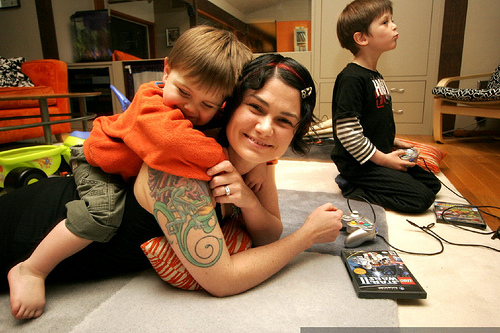
For years, researchers have been railing on the destructive nature of video games. To them, all these games are capable of doing is creating violent players who carry out their aggression on real-world victims.
But the fact of the matter is that these researchers weren’t looking at all the angles.
Other professionals have argued that there’s more to video games than meet the (biased) eye. For example, they’ve found that gaming makes you smarter and helps to strengthen not only neural connections in the brain, but helps dexterity and social skills.
And even more studies have shown that video games help strengthen family bonds and create better relationships between parents and children. Here’s what they found.
Video Games Generate Conversation
Part of the problem researchers discovered is that parents simply don’t take the time to understand their childrens’ gaming habits. But when they do, it opens up valuable discussions.
For example, researchers found when parents actually take the time to ask questions instead of just regulating gaming time, children are more than eager to explain how to play the games and the tension between the family members disappears.
“Video game play becomes a point of conversation, not a point of conflict,” said Sinem Siyahhan, an assistant research professor at Arizona State University. “On the flip side, it’s nice for the child to be able to teach his or her parents about gaming. Our research is finding that sharing this experience cultivates family bonding, learning and well-being.”
Video Games Promote Teamwork
In addition to conversation-starters, many video games can promote teamwork. This is more typically found in multiplayer games like Rock Band, but even the competitive games develop a sense of camaraderie.
The Arizona State University research team, led by Elisabeth Hayes, found that “games can involve families and collaborative problem solving, giving them a chance to work together to solve an issue.”
Hayes clarified that it’s important for families to find games that interest all the participating members to make this a successful experience.
Video Games Create Supportive Environments
In general, when parents show an interest in their kids’ video games and play teamwork-based challenges, they’re already supporting each other as family members.
But one Forbes contributor thinks it goes further than surface-level actions: “This is the world of my kids’ imagination. When I take it seriously (and participate along side of them), I’m not only validating their inner world by giving positive reinforcement to the things that matter most to them, I’m also providing fun and supportive space in which a sophisticated emotional intelligence can emerge.”
Creating a “safe space” around video games allows all family members to enjoy them without fear of rejection or punishment, therefore making ties and relationships even stronger.
Ultimately, video games haven’t turned out to be as problematic as initial researchers assumed. As with most entertainment, devices, and tools in this world, they can be used to make our lives better as long as we use them properly and in the right settings.
And used in that way, families can definitely enjoy video games together and grow as a unit!
